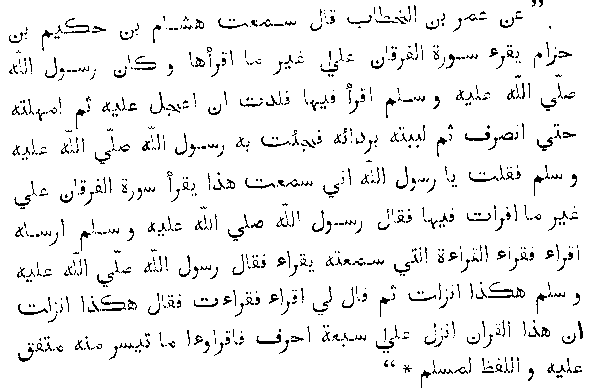
THE SEVEN READINGS OF THE QURAN
Muhammad did not give forth the whole of the Quran at one time but it was recited piecemeal as circumstances demanded, over a period of some twenty-three years. Even then, his immediate disciples did not commit the whole to writing ; some portions were memorized, others were transcribed upon 'palm leaves, leather, slabs of stone,' etc. ; yet discrepancies soon arose, and from the traditions we learn that within a comparatively short time serious differences arose in the reading of the Quran, differences by no means confined to pronunciation as some would have us believe. In the well-known book of traditions, the Mishkat-al-Musabih in the chapter called Fajail-ul-Quran we read : -

Umr-ibn-al-Khatab said, 'I heard Hisham-ibn-Hakim ibn-Hijami reading Sura Furqan in a different way from that which I was accustomed to do ; but the prophet had taught me this Sura. Then I wished to immediately forbid him, but allowed him to read to the end. Then I seized his dress, and took him to the prophet, and said, Oh prophet of God; I heard this man reading Sura Furqan in another way; he read it differently from what you taught me. Then the prophet said to me, 'Let him go.' He then told him to read. He then read in the manner which I had heard. Upon that the prophet said; It has been revealed in this way.' Again he said to me, 'Do you read also.' Then when I had read, he said, 'It was revealed in this way also; the Quran was revealed in seven readings, read it in the way which is easy to you'."
There are many traditions relating to this seven-fold reading of the Quran, and Muhammadan scholars have tried in various ways to explain its significance, but without success. The differences which existed in these seven different readings of the Quran were certainly very serious ; for in a tradition recorded by Nisai we learn that 'Umr boldly accused Hisham of falsehood, and asserted that he had read many words in his recitation of the Quran which be had never learned from the prophet. In another tradition, recorded by Muslim, we learn that Ibn-Kab, one of the most famous of the Quran readers, heard two men reciting the Namaz in a reading different from his own. Upon reference being made to the prophet, the latter pronounced both correct, "upon which," says Ibn-Kab "such a revolt arose in my heart as had not existed since the times of ignorance."
From these various traditions it is clear that even during the lifetime of the prophet the Quran was being read in various mutually conflicting ways. So grave were the differences that quarrels soon arose; for the inhabitants of Hims stood by the reading of Al-Miqdad-ibn-al-Aswad; the Kufites by that of Ibn-Mas'ud; the Busrites by that of Abu-Musa, and so on. But it would be a mistake to suppose that these differences simply consisted in the recitation of the Quran in the various dialects of Arabia, as some would have us believe; for there is ample evidence to show that the differences extended far deeper. Indeed we learn from the Itqan that the two men mentioned above, 'Umr and Hisham, were both of the same tribe, the Quraish, so that a supposed difference of dialect does not account for the difference recorded above. In succeeding chapters we shall show how serious these differences were, and shall relate some of the means adopted for their suppression.
The Quran in Islam [Table of Contents]
Answering Islam Home Page